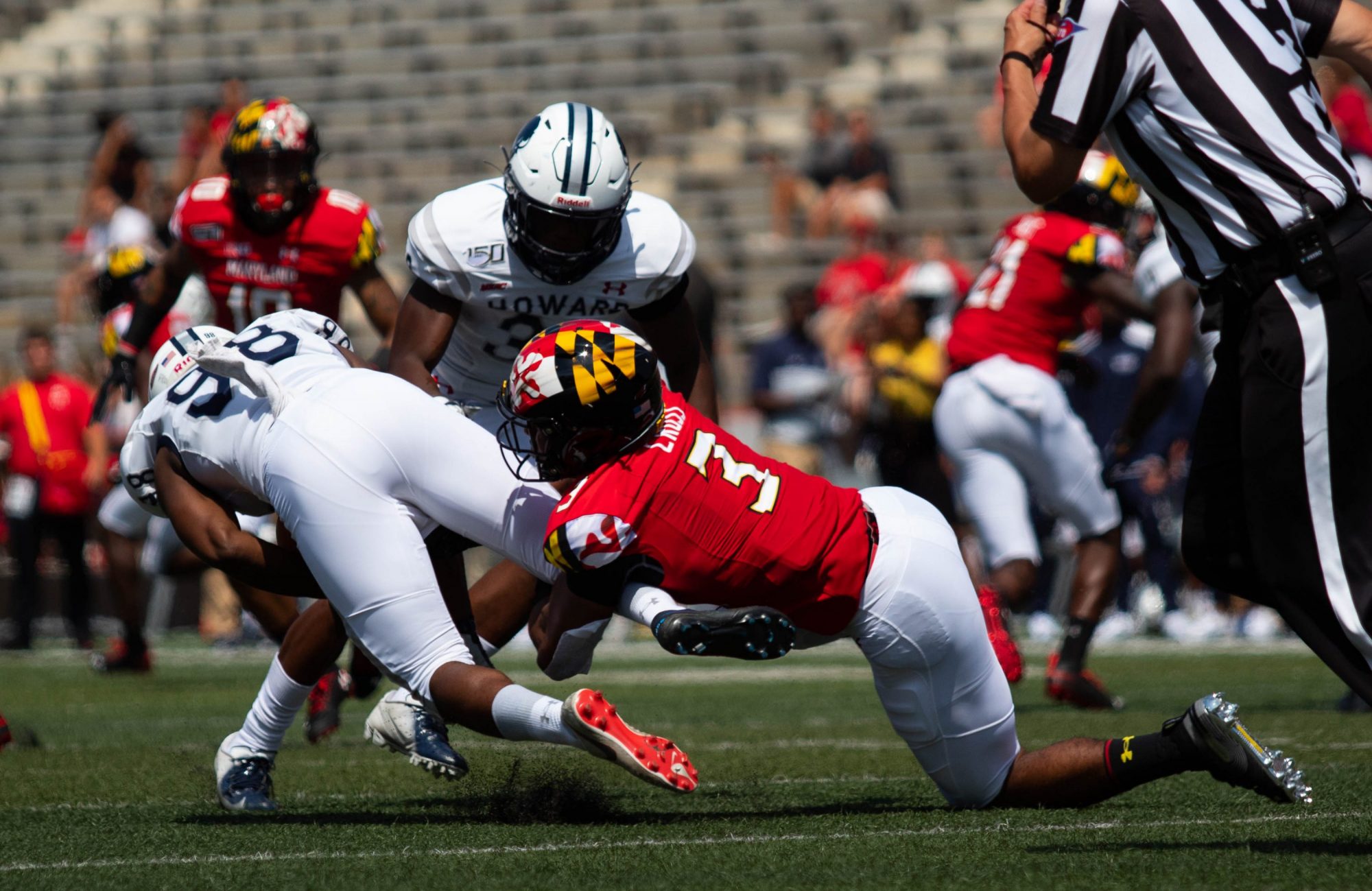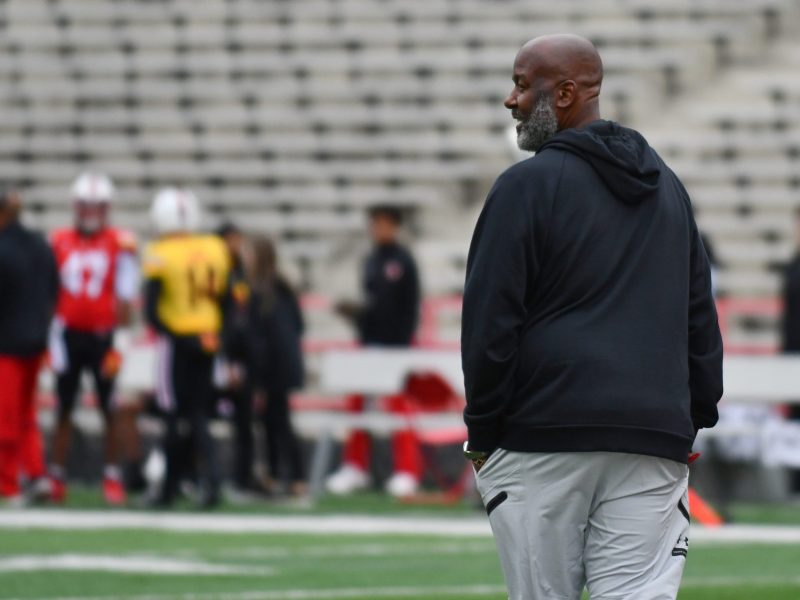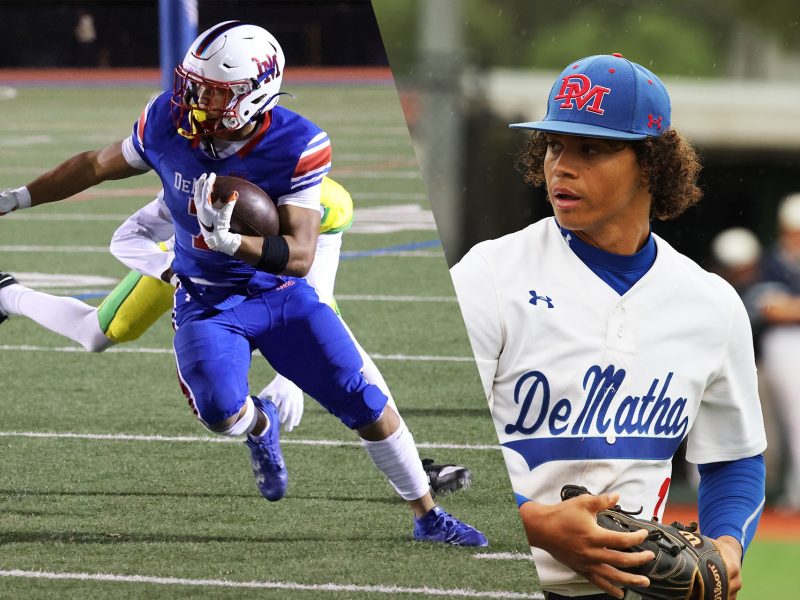As Anna Awah-Cross waited in her car, a steady stream of DeMatha Catholic football players made their way to their own rides. Anna scanned the faces passing by in search of her son, not finding him amongst the throng of athletes he now called teammates.
Finally, once the crowd died down and Anna’s car was one of the few remaining, Nick Cross would appear.
“How come you take so long?” Anna would ask. He’d only shrug it off.
Nick didn’t know how to go about things any differently, regardless if he was playing outside with friends or on the AAU basketball circuit in middle school. But football was his “first love,” as his parents described it, since he was old enough to watch Washington Redskins and Florida State games on TV. While his parents shied away from allowing their son to play such a contact-heavy sport when he was younger, they relented once he reached high school.
So there was no real reason for Nick to hurry off the practice field. This was the sport he always wanted to play. He was making up for lost time.
“Part of it is his competitive spirit,” Anna said. “He wants to be the best at everything he does.”
When Nick told the coaches he had never played organized football before, they thought he was joking. He would rise to All-American status, interested schools would soon begin to flood his mailbox, and college coaches would descend to meet him regularly. When Nick picked up track on a whim during his junior year, his parents said his speed surprised his coaches.
But even that decision was with football in mind, aiming to improve his quickness in the secondary. Nick may have started playing later than most, but he’s quickly overtaken much of the competition. And now as a starting safety with Maryland football, Nick epitomizes the type of player that coach Mike Locksley wants to bring to College Park — he’s a local four-star recruit who’s used to winning, and he knows just what it takes to get there.
Long after Locksley rides off the practice fields in his golf cart, and long after most of the players have ambled off toward Gossett Team House, Nick remains. He runs through drills for another 45 minutes as if he hadn’t just practiced for two hours, going through the same routines that helped him get his bearings with a new sport at DeMatha four years earlier.
That’s just the way Nick is.
“He has the characteristics of the great ones,” Locksley said. “To me, that’s how you develop your program. And that’s what I’m used to seeing from great players.”
A rapid rise
Michael Cross had cautioned his son to take his time with football. Nick had only been playing the sport for a year, on DeMatha’s freshman team, after all. He could aim for a place on the junior varsity squad as a sophomore, Michael suggested.
“He would have none of it,” Michael recalled.
Nick, who was not made available for an interview due to Locksley prohibiting freshmen from speaking with the media, had his eyes set on finding his way onto the varsity roster. And when Nick sets his sights on something, he’s not used to underachieving.
So Nick made varsity, then made his first start in the 2016 WCAC Championship at Maryland Stadium. Late in the fourth quarter, St. John’s expected DeMatha to run an onside kick, trailing by eight points.
Instead, the Stags booted it long. Nick raced down the field. He dove on the football at the 1-yard line, setting up his team’s offense with a prime chance to score.
Nick’s play offered DeMatha a lifeline, helping his team pull out an unlikely 34-29 victory in the very stadium he’d play in regularly one day. But even as Nick became a full-time starter on defense the next season and nation-wide recognition began to find him, his father didn’t get caught up in the hype.
“What’s going through my mind is that he needs to focus on his academics,” Michael said.
To Michael and Anna — who emigrated from Jamaica and Trinidad and Tobago, respectively — sports had their purpose. It was important for their son to exercise and have fun. But there’s a life after athletics, and it was more important to them that Nick wouldn’t be one-dimensional.
That focus shaped Nick’s high school career — he knew if his grade-point average dipped below a 3.5, he wouldn’t be allowed to play football — and played a role in his college search. He used it as motivation, his parents said. He had waited until high school to get his chance to play football; he wasn’t going to throw it away because of poor marks.
“There’s no guarantee in athletics,” Michael said. “You’re just one step away from an injury.”
Staying home
Anna doesn’t like football much. She doesn’t really understand it, either. As a result, she says, her coworkers track her son’s accomplishments more than she does. Michael played “real football” growing up, and if he needed to know anything about American football, he’d ask his son, even at a young age.
The Crosses didn’t grasp how good their son was — or how much attention he’d get — until Michael did a Google search for “Nick Cross” early in his son’s junior year.
“We started realizing that this was becoming a little bit more serious than we thought,” Michael said.
There was a 247Sports page, tracking interested schools and offering a Crystal Ball prediction for which program Nick might be leaning toward. On there, Michael saw his son was the top-ranked player in Maryland. Nick had an ESPN recruiting page, too, with more single-digit rankings.
In hindsight, Michael acknowledges perhaps it shouldn’t have been such a surprise. Nick had been invited to national showcases and letters from schools had already begun to stuff the mailbox. But seeing his son’s rising presence in football made him sit up and formulate a plan, determine how to judge schools and figure out what to ask coaches when they came knocking.
It wasn’t just about the state of the football program — academic and professional development would play a key role. If Stanford wasn’t on the other side of the country, Michael said, there’s no question Nick would have wound up there. Nick considered Notre Dame, but felt South Bend, Indiana, was too far and too cold.
Then there was Florida State, the team he’d watched on TV since he was a kid. Nick verbally committed to the Seminoles in September 2018. But his parents had their doubts about the program.
“Things came up with Florida State, and we as parents weren’t able to get good answers about those issues,” Michael said.
They met with the coaching staff and the university president. It didn’t resolve anything.
“What I saw was a very volatile situation there at Florida State,” Michael said. “Things had gone real sour. The whole mindset, the culture, it just wasn’t something that I thought was good for him. And having that conversation with the coaches, later on we decided we just weren’t going to allow him to go to Florida State. That was not something we could be comfortable with.”
At that point, Maryland was going through its own troubles — offensive lineman Jordan McNair died June 13, two weeks after suffering heatstroke at an organized team workout; an ESPN report described a “toxic culture,” coupling with McNair’s death to prompt two independent investigations; and coach DJ Durkin was subsequently fired.
During that turmoil, Nick had little contact with the Terps. But Maryland was the first college team he’d been around, when former DeMatha players would bring him to campus about two miles north on Baltimore Avenue since his freshman year of high school.
And while Michael felt Penn State was the best option both on and off the field, the dominoes began to fall into place for the university down the road. Locksley, who had led Alabama’s recruitment of Nick, took over the program. Elijah Brooks, Nick’s high school coach, was added to the staff as running backs coach.
“The changes there sort of swayed the choice that was made,” Michael said.
When Locksley was hired in December 2018, he inherited a recruiting class with eight three-star prospects. He and his staff compiled a list of recruits still available for the class of 2019, and Nick was a high priority — one of the first calls the coach made.
About two months later, Nick made his choice. He’d stay home. And that night, as Maryland basketball beat No. 12 Purdue, Nick was in attendance alongside Locksley, the kind of homegrown talent the coach built his reputation around persuading to join Maryland.
“We’re going to get better”
Even as a promising beginning to the 2019 season gave way to loss after loss — with a seven-game slide capping a 3-9 campaign — Locksley expected to hear from Nick. It might have been coming off the field after one of those defeats, with the freshman safety running up to his coach with words of encouragement.
“Coach, we’re going to get better,” Locksley recalled him saying. “We’ll have our day.”
Or it would be after he left the facility, a text or phone call to Locksley or another position coach asking how he played and how he could improve.
“Those are the types of kids I’m used to being around … and I want to recruit,” Locksley said. “They want to come here and be developed.”
Nick bought into the idea of a rebuild when he signed for the Terps. He knew it wouldn’t be like playing at DeMatha, where winning seasons are the norm. Maryland hasn’t managed an above-.500 campaign since 2014. The Terps racked up as many losses this season as Nick had in his entire varsity career.
“He wants to win,” Michael said. “He’s not the type of person who takes it lightly if his teammates aren’t as focused.”
But instead of jumping ship, Nick — who tied for team-highs with two interceptions and five pass breakups — is staying. He reaches out to other highly rated prospects on Instagram to persuade them about the program. He hosts recruits when they come to visit, passing on the favor former DeMatha players once provided him. And through it all, he keeps on training, honing the skills he’s developed after playing just five seasons of organized football.
So as coaches and other players leave the practice field and head toward Gossett Team House, another day done, Nick remains. He’s still the last to leave.






